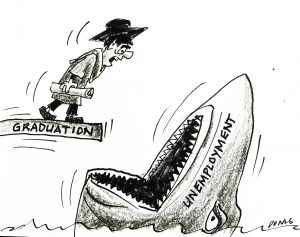As usual, the annual surge of college graduates in our country is greeted with a harsh reality as the job market is woefully unprepared to absorb them. Thousands of young Filipinos leave their universities each year brimming with hope and ambition, only to find that their degrees do not translate into meaningful employment. The disconnect between academic preparation and job availability highlights a serious systemic issue since many graduates end up in positions unrelated to their fields of study, with wages so low they can barely support themselves.
The plight of these graduates is further compounded by the inadequate alignment between educational institutions and industry needs. The curriculum often lags behind the rapidly evolving demands of the job market, leaving graduates ill-equipped for the available positions. Consequently, even those who secure employment often find themselves in roles that do not utilize their skills and knowledge. This mismatch not only wastes the potential of the workforce but also contributes to widespread job dissatisfaction and underemployment.
For those fortunate enough to have the resources to seek opportunities abroad, the journey is fraught with uncertainty. Overseas Filipino Workers (OFWs) frequently face hostile and exploitative working conditions. The grim reality is that some return home in coffins, victims of abuse and neglect in foreign lands. While overseas employment can offer higher pay, the risks involved highlight the desperate measures many are forced to take due to the lack of viable options at home. The government’s failure to create a robust, supportive employment landscape within the country drives this exodus, often resulting in tragic outcomes.
The entrepreneurial route, often suggested as an alternative, is not a feasible option for many due to the significant capital required. Starting a business demands not only financial resources but also access to networks, mentorship, and a stable economic environment. These are luxuries that many fresh graduates simply cannot afford. Without substantial support and investment in small and medium enterprises (SMEs), this option remains out of reach for the majority, perpetuating the cycle of economic struggle and dependence on inadequate job markets.
This persistent issue calls into question the value of the current educational system. If higher education cannot guarantee even a semblance of economic stability or career alignment, its purpose becomes dubious. The Philippine education system must undergo a comprehensive overhaul to ensure that it equips students with relevant skills and practical experiences. Collaboration between educational institutions and industries is crucial to developing curricula that are responsive to market demands. Furthermore, there must be a concerted effort to create more domestic employment opportunities, supported by policies that ensure business development and economic growth. We need to break this cycle of futile graduation and ensure that education serves as a true gateway to opportunity, rather than a path to disillusionment.




